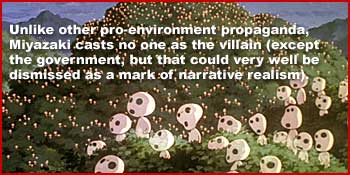Pollution, deforestation, the depletion of natural, non-renewable resources and a predicted doubling of the population by
2020 - this is the premise for many an apocalyptic anime plot line. But these factors are all very real and they are contributing
to the on-going ecological problem of global warming. A very serious issue that has thrust scientists and politicians into a
highly pressurized public debate through which the world hopes to achieve an effective, fiscally conservative environmental
policy. The art of anime, ever progressive and socially responsive, has been addressing these concerns in it's own way - trying
to offer answers, as well as warnings.
 |
 |
In the second episode of "Blue Submarine No. 6," Dr. Zorndyke decries the human race's careless dismantling of the Earth's
natural balance. As punishment, the former world science leader engineers a colossal machine to shift the planet's poles,
eliminating the magnetic field and allowing the crust to jostle freely about. Thus he condemns mankind to a fate that it would
eventually create for itself anyway, namely self-extinction by global warming. Odds are that no scientist with enough funding
actually exists to construct such a machine, but director Mahiro Maeda and screenwriter Hiroshi Yamaguchi's hyperbolic depiction
of Armageddon highlights the root problem in our own society's struggle with global warming, public apathy and self-centeredness.
Even as Zorndyke iterates truths about environmental irresponsibility, the heads of Blue Fleet, outraged at his holocaustal evil,
assault him with denigrating superlatives with nary an introspective glimpse at or a remorseful apology for the decisions their
species has made leading up to this conflict. As militant as ever, the remnants of mankind plan to hunt down and destroy their
present foe, an immediate solution to a persisting problem. Thus the creators of "Blue Sub" raise the question of who is
responsible. As the two sides quibble about fault and blame, the world decays.
Forests are the world's largest natural consumers of carbon dioxide, one of the most abundant greenhouse gases, and their
preservation and replanting areas already harvested for human consumption could offer the global community a natural way to
reduce greenhouse emissions - a symbiotic relationship illustrated in "Princess Mononoke" where director Hayao Miyazaki develops
a far more balanced template for environmental policy. Unlike other pro-environment propaganda, Miyazaki casts no one as the
villain (except the government, but that could very well be dismissed as a mark of narrative realism). The inhabitants of the
forest fight for their lifestyle with equal vigor as the city people, and each are governed by primarily and necessarily
sympathetic convictions.
Anime's answer is that we are all responsible, a concept that ostensibly governs the international discourse on the subject.
This should be held up for comparison against a Hollywood address of the subject: In 1996 "The Arrival" postulated that humans are
indeed not the cause of advanced global warming, but rather are the victims of aliens who have come down to Earth for colonization
and need to increase the temperature for their own purposes. And more recently, "Waterworld" tackled the sensitive subject by
dressing up Dennis Hopper as a pirate leaving a be-gilled Kevin Costner to kill the bad oil burners. (But, in defense of big
budget movies, no matter how ridiculous or off topic they may get, the community has been an avid supporter of progressive
agendas such as environmental conservation.)
 |
|
The world community has taken earnest, progressive steps as well. Apt for an analysis of anime's role in changing the world,
the latest monumental forum for this debate was Kyoto, Japan where in 1997 the international Conference on Climatic Change
gathered world leaders together to address the issue of global warming. Their agreement, recognized as the Kyoto Protocols,
outlined the responsibilities of each nation to contribute to the reduction of greenhouse gas emissions - the primary cause of
accelerated global warming - and articulated ways in which each nation can meet their responsibility. However, the efficacy of
the agreement has been the topic of further debate. Issues such as the lack of enforcement in developing worlds, where the most
notable rise in greenhouse gas emissions will take place, and the adverse economic impact on citizens of first world countries
compromise international adoption of the protocols. So, four years after the agreements were reached at Kyoto the world still
bickers about how to implement protective measures and, more importantly, who is responsible for what.
